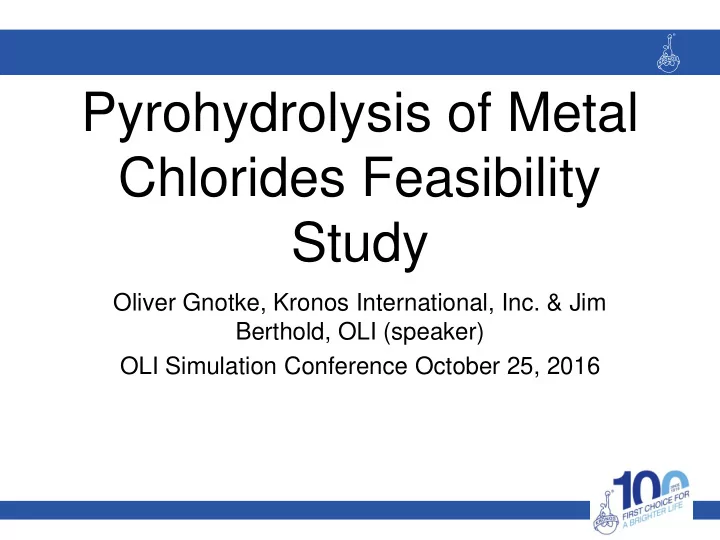

Pyrohydrolysis of Metal Chlorides Feasibility Study Oliver Gnotke, Kronos International, Inc. & Jim Berthold, OLI (speaker) OLI Simulation Conference October 25, 2016
Abstract • Production titanium dioxide creates significant amounts of an aqueous metal chloride solution as a by-product. – Land filling of the solid residue is the normal waste removal process – pyrohydrolysis is a viable way to convert metal chlorides from TiO2 production into the valuable products hydrochloric acid and metal oxides with iron oxide as main component. • The metal chloride solutions are complex highly concentrated aqueous solutions of di- and trivalent iron chlorides, other metal chlorides and hydrochloric acid. • Kronos followed a theoretical approach for a feasibility study to assess the pyrohydrolysis process. – As a first step it was essential to evaluate the applicability of OLI Stream Analyzer for metal chloride solutions. – For the simulation of a pyrohydrolysis process especially the prediction of solubility limits of salts and vapor pressures of HCl are important . – Available literature data was taken for the system FeCl2-HCl-Water and compared with OLI results. The deviation of OLI results and literature data were quite small. This qualified OLI as a valuable tool for the feasibility study.
Pyrohydrolysis Reaction • Pyrohydrolysis: Convert metal chloride solution into metal oxide and HCl • Reaction is carried out in fluidized bed or spray tower at temperature of 600-800 ° C • HCl is recovered from gas stream by absorption columns 4 FeCl 2 + 4 H 2 O + O 2 2 Fe 2 O 3 +8 HCl 2 FeCl 3 + 3 H 2 O Fe 2 O 3 +6 HCl
Manufacturing of Titanium Dioxide & potential benefit of Pyrohydrolysis Rutile Chlorine Ilmenite HCl Chloride TiO2 (High Iron Leaching Process content) Metal chloride solution HCl Metal Metal Chloride Chloride HCl Pyrohydrolysis Pyrohydrolysis Metal Oxide Neutralisation & Landfill Metal chloride solution HCl for sale
PROCESS Metal Steelworks Scrap Nickel Ore Processing Separation Production Process Stages: Extraction Dissolving Extraction Dissolving Pickling • Reactor, Cyclone, Liquid Station Liquid Station Line Oxide Station Off-Gas • Preconcentration Absorber Scrubber Stack Cyclone • HCl-Absorption Venturi Reactor Fan • Gas Cleaning Separator System Fuel Air Regenerated Acid Treated Oxide Oxide
KRONOS project • Feasibility Study for Pyrohydrolysis using OLI • No pilot unit available • Economic assessment • First step: Check OLI Stream Analyzer results against available literature data
Vapour Pressure as a function of temperature • 0,16 kg/kg HCl und 0,16 kg/kg FeCl 2 0,6 0,5 0,4 Pressure [bar] 0,3 Literature OLI 0,2 0,1 0 40 50 60 70 80 90 100 Temperature [°C]
Gas phase composition in the system FeCl2-Water-HCl • Comparison OLI with literature data [Che70 ] @70 ° C, FeCl 2 -conc. 0,78 mol/l • OLI Bubble point calculation, variable pressure HCl liq. conc. [kg/kg] 1 0,00 0,10 0,20 0,30 0,1 Mol% HCl in gas phase Literature OLI 0,01 0,001 0,0001
System pressure • Comparison OLI with literature data [Che70 ] @70 ° C, FeCl 2 -conc. 0,78 mol/l • Good prediction of azeotrope 0,35 0,3 Total pressure [bar] 0,25 0,2 Literature 0,15 OLI 0,1 0,05 0 0,00 0,05 0,10 0,15 0,20 0,25 0,30 HCl-conc. liq.[kg/kg]
OLI prediction on influence of FeCl2 • HCl concentration in gas phase higher with addition of FeCl2 • Azeotrope shifted by FeCl2 addition • Solutions with high salt concentrations could deliver over azeotropic hydrochloric acid (i.e. > 20% HCl) HCl liq. conc. [kg/kg] 0,35 1,00E+00 0 0,1 0,2 0,3 0,3 0,25 1,00E-01 Mol% HCl in gas phase Pressure [bar] OLI with FeCl2 0,2 OLI with FeCl2 0,15 1,00E-02 OLI without FeCl2 OLI without FeCl2 0,1 0,05 1,00E-03 0 0 0,1 0,2 0,3 1,00E-04 HCl-conc. liq [kg/kg]
FeCl2 /FeCl3 in HCl solubility data from OLI database 30 60 0C t=25C 25 50 20C FeCl2.2H2O 40C 20 40 60C FeCl2.4H2O m-FeCl3 wt%-FeCl2 100C 15 30 FeCl3.6H2O FeCl3.3.5H2O FeCl2.2H2O 10 20 FeCl3.2.5H2O FeCl2.6H2O FeCl3.2H2O 5 10 FeCl3.HCl FeCl2.4H2O 0 0 0 5 10 15 20 25 30 0 10 20 30 40 wt%-HCl m-HCl
OLI comparison MgCl2 solubility in HCl Magnesium Chloride Solubility in Hydrochloric Acid 40 -20C 35 -8C 0C 25C 30 38C 48C 60C 25 70C MgCl2, weight % 20 15 10 5 0 0 5 10 15 20 25 30 35 40 45 50 HCl, weight %
Conclusions • Good prediction of OLI both in – VLE – Solubility • Valuable tool for the chloride system • Next possible step – Coupling of OLI with ASPEN for full flowsheet simulation of Pyrohydrolysis – Aspen needed for high temperature equipment
Literature • [Che70] Chen, McGuire, Lee: Vapor-Liquid Equilibria of the Hydrochloric Acid-Ferrous Chloride-Water System. Journal of Chemical and Engineering Data, Vol. 15, No.2, 1970 • [Sch52] Schimmel, F.A.: The Ternary System Ferrous Chloride-Hydrogen Chloride- Water, Ferric Chloride-Ferrous Chloride-Water, 1952 • Pyrohydrolysis: Fundamentals and Applications for the Ferrous and Non-Ferrous Metallurgy,Dr. Frank H. Baerhold, Dr. Albert Lebl, Rewas '99: Global Symposium on Recycling, Waste Treatment and Clean Technology by I. Gaballah (Editor), J. Hager (Editor), R. Solozabal (Editor)
Biography • Dr.-Ing. Oliver Gnotke, born 1971 in Düsseldorf /Germany is the team leader Chloride Process development for Kronos International, Inc., Leverkusen/Germany a leading producer of titanium dioxide with 6 production locations worldwide. He works for Kronos since 12 years having positions in different technical departments. His main responsibility is the optimization of the production sites with respect to cost, quality and throughput. He has wide experience with CAE tools as for example flowsheet simulation, CFD and thermodynamic properties estimation. • Prior to his work for Kronos he worked from 1999-2004 as research assistant at the Chair of Energy Technology, University of Darmstadt/Germany. His main research topics were experimental studies and simulation of multiphase flow in chemical and power plants. Graduated 2004 to PhD (Dr.-Ing.). • He started his studies as Chemical Engineer at the University of Dortmund, Germany. During university studies he made several internships in the chemical industry as Bayer, Henkel, CFPI (France) and Lurgi Engineering where he optimized polymerization reaction using numerical simulations.
Recommend
More recommend